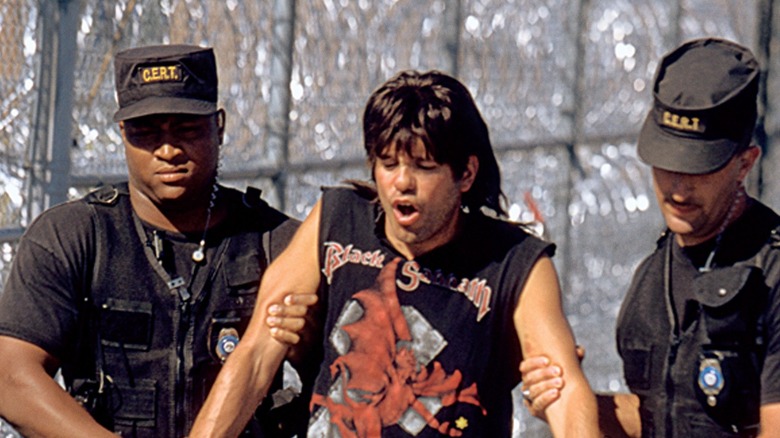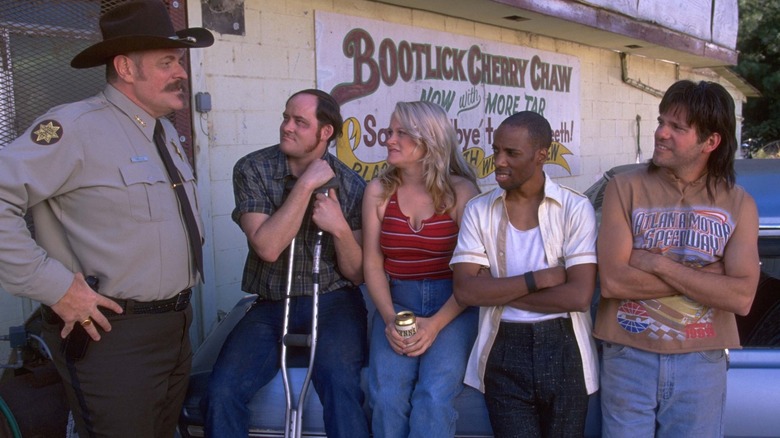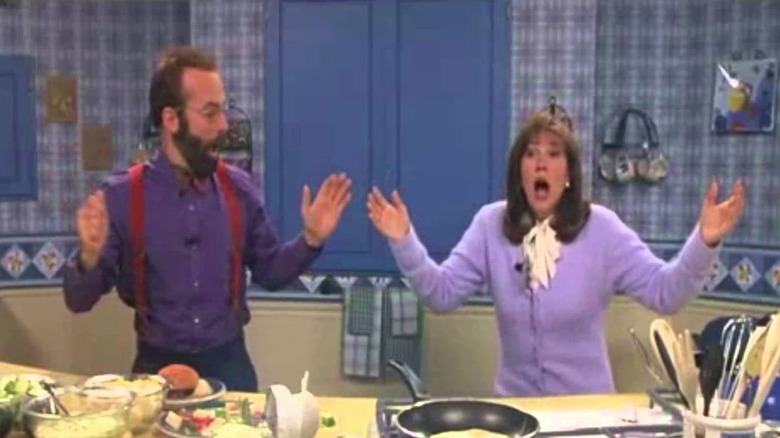Bob Odenkirk And David Cross Remember Run Ronnie Run As A 'Debacle'
The 1990s saw an impressive run of successful comedies that drew inspiration from "Saturday Night Live" characters, including "Waynes World" and "Superstar." When New Line Cinema wanted to get in on the sketch comedy movie action, they turned to a popular HBO sketch comedy program, "Mr. Show." The very first character to appear on "Mr. Show" inspired the 2002 movie, "Run Ronnie Run."
The movie is the brainchild of "Mr. Show" creators Bob Odenkirk and David Cross. Salesman Terry Twillstein (Odenkirk) is desperate for something to sell when he stumbles across Ronnie Dobbs (Cross). Dobbs has a penchant for getting arrested and giving excuses as to why the cops shouldn't arrest him ("I lived here first and then people built the house around me," after being asked by police if he lives at the house he's hiding in is my personal favorite). Shenanigans ensue when Twillstein takes Dobbs to Hollywood and sells a reality show about Ronnie Dobbs running from the law in every U.S. city.
"Run Ronnie Run" might not be a great film, but it has its moments. It serves as a fantastic satire of reality television in the early 2000s. It was never released in theaters, and Odenkirk and Cross remember the project as a debacle because the studio got too involved with the production.
They lost creative control of the movie
"Mr. Show" ran for four seasons and was HBO's darker, edgier version of "Saturday Night Live." The movie stays true to that sentiment, serving as a less sanitized version of the mid-90s "SNL" comedies. The movie features, among other things, a tv show host killed by a rogue food processor blade (and then shown repeatedly as a gag). When a participant on a "Survivor"-esque reality show is voted off the island, the host stabs him to death and the remaining players eat him for dinner.
New Line Cinema approached Odenkirk and Cross about taking one of their characters to the silver screen during the final season of "Mr. Show." But as the pair revealed in a 2013 NPR interview, the more the studio got involved, the less it felt like their own movie. Cross said:
"We assumed it was going to be a collaborative work in which we'd have kind of the same amount of control that we had on our show, what made us successful enough to get to do this movie. And in part, we were rewriting it and rewriting it and rewriting it and making it each step of the way a little bit less 'Mr. Show' and more kind of that 90-minute comedy movie that was popular back then."
By the time the film was ready for post-production, Odenkirk and Cross were no longer involved. "Once it was done shooting, we were out, completely out, like, totally frozen out," Odenkirk revealed.
The result was disastrous for the movie, but it led to an entirely new project for Odenkirk and Cross.
The experience led to a book
Because the creators behind the film lost creative control in the editing process, we'll never fully know the potential of "Run Ronnie Run." It never got a proper theatrical release and remains an obscure comedy today. But the experience of dealing with Hollywood inspired Odenkirk and Cross to write a book, "Hollywood Said No!" The book features two screenplays and several other sketches that never made it to the screen. Odenkirk opined:
"We screwed up by trying to reach out too far to the industry and write this character-based narrative. Let's just write a sketch movie. That's what we do."
Both comedians have gone on to have incredibly successful careers in Hollywood. Odenkirk crossed genres to action and drama with the Netflix series "Better Call Saul" and the 2021 movie "Nobody." Cross has an expansive filmography that includes the "Never Nude" Tobias Fünke in "Arrested Development." He also starred in and served as executive producer on the IFC series "The Increasingly Poor Decisions of Todd Margaret."
Even though you might have to search a little harder to find "Run Ronnie Run" instead of the random mid-90s "SNL" comedy, it's worth it to see how Odenkirk and Cross creatively predict the debacle that was the reality TV movement that took place over the next two decades.


